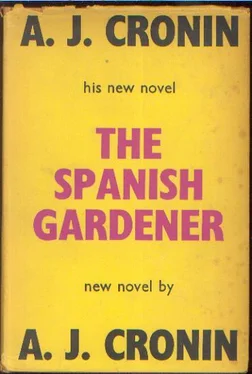Archibald Cronin - The Spanish gardener
Здесь есть возможность читать онлайн «Archibald Cronin - The Spanish gardener» весь текст электронной книги совершенно бесплатно (целиком полную версию без сокращений). В некоторых случаях можно слушать аудио, скачать через торрент в формате fb2 и присутствует краткое содержание. Жанр: Классическая проза, на английском языке. Описание произведения, (предисловие) а так же отзывы посетителей доступны на портале библиотеки ЛибКат.
- Название:The Spanish gardener
- Автор:
- Жанр:
- Год:неизвестен
- ISBN:нет данных
- Рейтинг книги:4 / 5. Голосов: 1
-
Избранное:Добавить в избранное
- Отзывы:
-
Ваша оценка:
- 80
- 1
- 2
- 3
- 4
- 5
The Spanish gardener: краткое содержание, описание и аннотация
Предлагаем к чтению аннотацию, описание, краткое содержание или предисловие (зависит от того, что написал сам автор книги «The Spanish gardener»). Если вы не нашли необходимую информацию о книге — напишите в комментариях, мы постараемся отыскать её.
The Spanish gardener — читать онлайн бесплатно полную книгу (весь текст) целиком
Ниже представлен текст книги, разбитый по страницам. Система сохранения места последней прочитанной страницы, позволяет с удобством читать онлайн бесплатно книгу «The Spanish gardener», без необходимости каждый раз заново искать на чём Вы остановились. Поставьте закладку, и сможете в любой момент перейти на страницу, на которой закончили чтение.
Интервал:
Закладка:
After breakfast, before departing for the office, he drew Nicholas aside into the embrasure of the salon, and with a kind of painful logic explained to him what he was forced to do. It eased him somewhat that the boy listened with proper docility, for he had feared the possibility of another outburst, a scene. Only when he was about to leave, as he stepped from the portico to the car, did Nicholas, standing at the front door, raise his bowed head.
"Don't go. Father." He spoke in a low voice, with only the faintest tremor of his lips.
"I must, Nicholas."
At that the boy suddenly gave way and, with a little rush, cried out:
"Father, I beg of you not to go. It is not necessary. Let them take José without you."
But Brande was by this time in the automobile. He raised a restraining hand, shook his head in reproof, and the next minute was gone.
At the office, during the forenoon, he studiously kept his thoughts away from the coming journey. Several intending immigrants had to be interviewed and their documents attested, after which a number of ship clearances demanded his attention; and when these had been disposed of he sat down to draft a letter to Restaud et Cie ., a firm of Parisian publishers recommended by Halevy as being most likely to do justice to his work on Malbranche. His pen did not flow with its customary fluency and, for some reason, he felt sluggish, bound by a physical lethargy. Yet it gave him a momentary satisfaction to reflect that his manuscript was at last complete, parcelled in his bedroom, ready for the mail.
At one o'clock, shunning the public gaze of the Chantaco, he had a sandwich and a cup of coffee brought to his room; then, some twenty minutes later, he set out for the station. Rain had begun to fall, in large warm drops which left coin-like splashes on the dusty pavements, yet the Consul walked slowly, unmindful of the wet. So rabidly had he anticipated this moment, this hour of justice, that he experienced within himself a strain of anger that his mood should be so listless and so dull. Of course he had again been sleeping atrociously and on the previous night had snatched barely an hour of fitful slumber. Yet this alone could not explain the change in him. Fantastic though it seemed, he had not yet shrugged off the recollection of his indiscretion—the word was his own—on that torrid afternoon, two days before. Nor could he banish from his mind that gnawing doubt of Garcia. Strive as he would, it kept creeping back upon him, shaking his pose of high integrity, infusing him with intolerable despondency.
At the station the party had already arrived—Pedro, José and the guardia , sheltering together on the platform under the projecting roof of the despacho de billetes . The Consul looked at them heavily, observing with vague astonishment how gaunt and sallow José had become, how unkempt was his appearance, how closely the handcuffs forced him to stand beside the guardia . Viewing him after the interval of a week Brande was conscious of no especial surge of his aversion, only a queer reluctance which increased as, having taken his ticket, he advanced towards the youth. He was like an automaton, compelled by forces which he himself had set in motion, and were now out of his control.
When he reached the little group, Pedro and José avoided his gaze but the guardia saluted him briskly with his free hand.
"Wet, isn't it?" Brande remarked, after a moment.
"Very wet, señor," the guardia answered, briefly, yet respectfully.
There was a long pause during which the Consul's eyes kept straying to those shining handcuffs. Somehow they provoked him to a strange distaste. The steel bracelet, he could see, had raised a weal upon the guardia’s wrist. And suddenly he exclaimed, in a voice which, though irritated, remained aloof:
"Do you need these things?"
"Only until we are safely in the train, señor."
Again a heavy silence fell, broken by the drumming of the rain on the corrugated roof and the low mutter of voices from behind the barrier. Through the singular sense of fantasy that now enveloped him Brande became aware of the crowd that had gathered outside the despacho , of their hostile stares and vulgar imprecations. In a dignified manner he averted his gaze. A moment later Pedro, detaching himself, shuffled off to buy a newspaper. When he returned he made, in an undertone, some remark to José concerning the weather. José did not answer. Fretfully, the Consul shifted his position. Would the train never come? This waiting was intolerable.
At last, the air was rent by a shrill whistle, the pounding and screech of wheels. As the short train jerked to a stop Brande moved forward with a feeling of relief and preceded the others into the single wooden compartment. There were few other passengers, mostly country people, a pair of travelling salesmen, some old women with baskets. It had been his intention to secure a position facing José, but something now withheld him. Instead he seated himself a little distance away, at the top of the coach, before a spotted mirror advertising some liquid dentifrice. Thus, though his back was towards the group, he could see the dim reflection of what was taking place. Settling himself on the ribbed wooden bench he prepared to endure the usual delay occasioned by the switching of the engine.
Finally this was done and, with a start and a bump, they clattered off. Viewing the scene behind him, as the train picked up speed, Brande saw the guardia take a key from his pocket and unlock the handcuff from José's wrist. The youth muttered a word of thanks and began to chafe the circulation into his hand. Pedro, with the paper before him, was reading aloud, apparently trying to interest the others in the sporting news. But neither gave him much attention. The guardia , sitting erect, maintained a correct official attitude, while José, with his face averted, stared steadily through the corridor at the fleeting, rain-drenched landscape.
That fixed and pensive profile, emptied of all gaiety, stamped with a new maturity, with a grave personal dignity, began slowly, and in a most distressing manner, to affect the Consul. He ought, surely, to have rejoiced in this just retribution for the harm inflicted upon him. But he could not. The victory had suddenly become hollow, dust and ashes in his mouth. Studying José's image covertly in the mirror, he felt an extraordinary weakness creep over him. And he had a sudden impulse to go over to the youth, to speak to him kindly, to promise a measure of leniency. Yet how, in Heaven's name, could he do that now? The idea was nonsense. By a tremendous effort the Consul wrenched his eyes away from the glass and, removing his hat, wiped with his handkerchief the perspiration which rimmed his brow.
The heat in the compartment was unbearably oppressive. Although the end door immediately in front of Brande was open, the rush of humid air which entered was like a furnace blast. In addition, he became aware that he had placed himself adjacent to the común, the coach latrine which on this line, was never maintained in a proper condition.
Yet he would not or could not change his position but remained sunk into himself, gripped by a profound lethargy, while the atrocious train rattled and swayed over the uneven metals. From time to time someone pushed past him in the narrow aisle to enter the común . The heavy grinding of the wheels came in bursts, exploding like surf against his eardrums, echoing and re-echoing through his head. Was he ill? Instinctively, he asked himself the question. But no, despite his febrile symptoms he knew that his disorder was not physical. It was, if anything, an affliction of the spirit, an apprehension he could not name, fallen from he knew not where, weighing upon him with the imminence of doom.
Читать дальшеИнтервал:
Закладка:
Похожие книги на «The Spanish gardener»
Представляем Вашему вниманию похожие книги на «The Spanish gardener» списком для выбора. Мы отобрали схожую по названию и смыслу литературу в надежде предоставить читателям больше вариантов отыскать новые, интересные, ещё непрочитанные произведения.
Обсуждение, отзывы о книге «The Spanish gardener» и просто собственные мнения читателей. Оставьте ваши комментарии, напишите, что Вы думаете о произведении, его смысле или главных героях. Укажите что конкретно понравилось, а что нет, и почему Вы так считаете.












